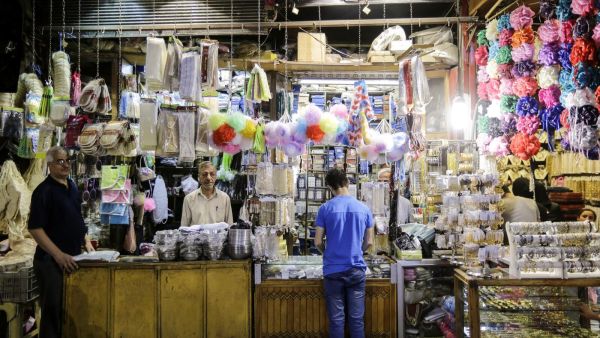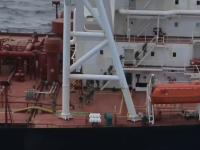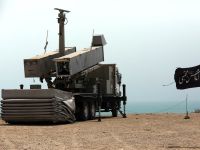Syria’s economy is in trouble. The arrival of the coronavirus has accelerated the decline in the value of the Syrian pound and further haltered manufacturing and agricultural work in the country. In response, other countries in the Middle East and from further afield have begun to vie for influence over Syria’s economy.
Before the revolution in 2011, the Syrian pound was valued at around 47 SYP to 1 USD. By late March this year, it reached its lowest point on record, 1,325 SYP to 1 USD on the black market. It has since stabilized at around 1,220 SYP to 1 USD. Nevertheless, this stabilized rate still represents a more than 50% devaluation compared to the same time last year.
Together with a devalued currency, there have been food shortages and price hikes, some food staples have increased by up to 40% in the past two weeks. Hygiene products, such as hand-sanitizer, and protective equipment, such as facemasks, have risen by up to 5000%. In response, the Central Bank of Syria (CBS) has attempted to stabilize the official currency and bring it closer to that of the black-market rate.
Hygiene products, such as hand-sanitizer, and protective equipment, such as facemasks, have risen by up to 5000%. In response, the Central Bank of Syria (CBS) has attempted to stabilize the official currency and bring it closer to that of the black-market rate.
Although the economy has been in free-fall since the outbreak of the civil war, the arrival of COVID-19 into Syria has encouraged the decline in the economy and put significant strains on health systems. The Turkish news agency AA has reported that, in a recent meeting of the International Syria Support Group Humanitarian Task Force, Najat Rochdi said that "humanitarian assistance has never been more critical for the entire country. All Syrians, and all those who provide assistance, are at risk.” Rochdi is an advisor to the United Nations on Syria.
As people are told to stay isolated at home or become sick with the virus, the economy will become even weaker. This doesn’t apply only to Syrians inside the country. Since 2011 over 5.6 million people have left Syria. Over 5 million of these people live outside of refugee camps, in cities and rural areas. Finding work in as day-laborers or in construction is very common, industries that are now deemed “unessential” in a lockdown. Remittances are then even less likely to be received by those within Syria.
Remittances are now believed to make up around 15% of Syria’s GDP.
Remittances are now believed to make up around 15% of Syria’s GDP. But the fall in available work in host countries and the weakened Syrian currency have made sending money back home even more difficult than before. Higher international banking fees, restrictions on travel, and an unfavorable official exchange rate means that those wishing to send money will either be unable to or send less than they otherwise would wish.
In the context of such a drastic economic situation, many states in the Middle East and further afield are poised to invest in the Syrian economy in order to ensure influence once the virus and civil war have subsided. Many of those poised to invest are members of the Gulf Cooperation Council (GCC), a union of seven Arab states on the Persian Gulf, except for Iraq.
However, the price of oil, the main source of income for GCC suppliers, has dropped significantly since the start of the COVID-19 crises. On Monday, the price of US oil dropped by more than 105% to less than $2 per barrel. This meant that oil producers were forced to pay buyers to take crude oil which could no longer be stored. In response to the news from the US, stock prices dropped in GCC states. The index in Dubai dropped by 1.4%, whilst Saudi Arabia’s benchmark index fell by 1.2%.
But, no matter how weak the economies of the GCC might be, they will try to invest in Syria in order to coax the country away from their historic alliance with Iran.
But, no matter how weak the economies of the GCC might be, they will try to invest in Syria in order to coax the country away from their historic alliance with Iran. Damascus and Tehran have been at the forefront of anti-Israeli policy since the 1980s when the Syrian and Iranian backed Hezbollah grouped responded to the Israeli invasion. The GCC and Israel have, more recently, backed opposition groups in Syria against al-Assad’s government.
Signs of a thawing in relations, however, are beginning to appear. The Syrian pro-government newspaper Al-Watan reported earlier in the year that Syria’s representative to the United Nations attended a ceremony in honor of Saudi Arabia’s Minister of State. “During the gathering, the Saudi officials expressed their belief that what has happened between the two countries should pass, stressing on the brotherly relations that have long brought Syria and Saudi Arabia together,” the Middle East Eye reports the paper as having reported.
Despite these positive signs, only a few months previously it was reported that Armaco and the US government had signed a deal on the oil fields, Syria’s largest, in the Kurdish-controlled region of the country. In response, it was reported that Syria had spoken of the “looting” of Syrian oil by the US.
Syria’s economy, therefore, has become as much a battleground as its land.
Syria’s economy, therefore, has become as much a battleground as its land. The GCC, as well as the US, Turkey, and Russia, are pushing their economic weight to create positive relations with Syria’s al-Assad. But as COVID-19 threatens to further worsen the economic situation of Syria and its people, and as the price of oil plummets to below zero in the US, which way the tables will shift will remain to be seen. One thing we can know, however, is that those who will feel the economic backlash from the virus will be the people of Syria, of whom over 80% are now living below the poverty line.
The views expressed in this article do not necessarily reflect those of Al Bawaba News.







